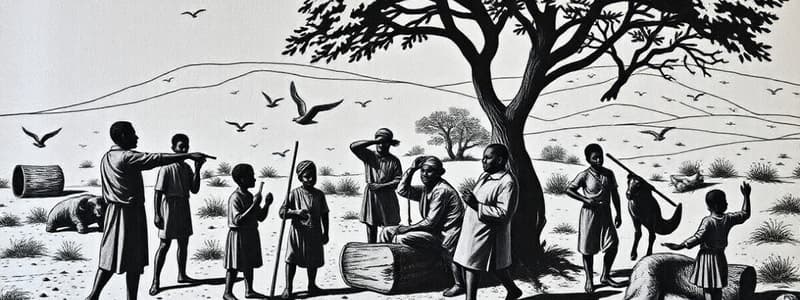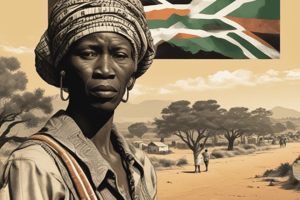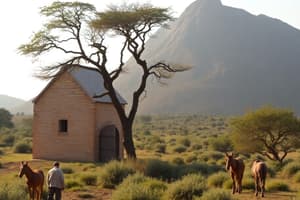Podcast
Questions and Answers
What significant event took place regarding the Natives' Land Act in June 1913?
What significant event took place regarding the Natives' Land Act in June 1913?
- It was signed into law. (correct)
- It was amended.
- It was introduced to Parliament.
- It was repealed.
Who was General Hertzog in the context of South Africa's political environment?
Who was General Hertzog in the context of South Africa's political environment?
- An advocate for native rights.
- A leader of the British forces.
- A government minister who was dismissed. (correct)
- A notable author of the time.
Which group was Chief Dinizulu-ka-Cetywayo associated with before his release?
Which group was Chief Dinizulu-ka-Cetywayo associated with before his release?
- South African Native National Congress.
- Zulu kingdom leadership. (correct)
- Labor union organizations.
- British colonial administration.
What was a consequence of the discriminatory practices implemented by the government?
What was a consequence of the discriminatory practices implemented by the government?
Who was mentioned as providing support during the author's inquest?
Who was mentioned as providing support during the author's inquest?
What role did Rt.Hon.Abraham Fischer have in the political landscape discussed?
What role did Rt.Hon.Abraham Fischer have in the political landscape discussed?
Who organized for the South African Native National Congress?
Who organized for the South African Native National Congress?
What was a derogatory term used to refer to British Indians?
What was a derogatory term used to refer to British Indians?
What was the setting of the events discussed?
What was the setting of the events discussed?
Who provided additional information about the evictions due to the Natives' Land Act?
Who provided additional information about the evictions due to the Natives' Land Act?
What was the primary objective of the author in documenting the hardships faced by South African natives?
What was the primary objective of the author in documenting the hardships faced by South African natives?
How did the Natives' Land Act of 1913 impact native land ownership?
How did the Natives' Land Act of 1913 impact native land ownership?
What role did personal observations play in the author's narrative?
What role did personal observations play in the author's narrative?
What did the author suggest about the relationships between different races before the Natives' Land Act?
What did the author suggest about the relationships between different races before the Natives' Land Act?
Which consequence of the Natives' Land Act does the author specifically critique?
Which consequence of the Natives' Land Act does the author specifically critique?
What sources of support did the author acknowledge during his research?
What sources of support did the author acknowledge during his research?
What aspect of the Natives' Land Act is emphasized in the author's narrative?
What aspect of the Natives' Land Act is emphasized in the author's narrative?
What overarching theme does the author address regarding the native population?
What overarching theme does the author address regarding the native population?
Which of the following best describes the author's approach to documenting the conditions of South African natives?
Which of the following best describes the author's approach to documenting the conditions of South African natives?
What did the author seek to uncover through his investigations across South Africa?
What did the author seek to uncover through his investigations across South Africa?
Flashcards are hidden until you start studying
Study Notes
Native Life in South Africa
- This text is a prologue from a book written by a South African native workingman.
- The author is documenting the struggles faced by South African natives under the Natives' Land Act of 1913.
- The Act restricted native land ownership, leading to evictions and hardship for the native population.
- The author outlines the financial challenges he faced while investigating and reporting on the Act across South Africa.
- He highlights the support he received from friends and individuals who provided information.
- The book aims to shed light on the complex and challenging situation of land rights, government actions, and racial tensions in South Africa.
- The text appeals for support in repealing the Natives' Land Act as an unjust law.
The Impact of the Natives' Land Act
- The Act restricted native land ownership, leading to evictions and financial hardship for the native population.
- The author emphasizes the oppressive nature of the Act on the lives of South African natives.
- It focuses on the harsh realities and unfair treatment that native people experienced.
The Political Climate in South Africa
- The text highlights the political environment after the Union of South African Colonies and the shift in policies towards natives.
- The author discusses the contrast between harmonious relationships between different races before the Act and the turmoil caused by the legislation.
- The text emphasizes the financial exploitation of natives, the dismissal of General Hertzog, and the discriminatory practices implemented by the government.
Specific Individuals and Events
- Mr. W.Z. Fenyang offered transportation and support during the author's investigation.
- Mr. J.M. Nyokong assisted with expenses for a visit to the Cape.
- Mr. C.S. Saul Msane was an organizer for the South African Native National Congress.
- Mr. Dube was the president of the South African Native National Congress.
- Mr. W.D. Soga accompanied the author on part of his journey to the Cape.
- Mr. Attorney Msimang provided information on the evictions due to the Natives' Land Act.
- Lord Gladstone signed the Natives' Land Act in June 1913.
- General Hertzog, the Minister of Native Affairs, was dismissed.
- Rt. Hon. Abraham Fischer delivered an undignified speech in Bethlehem.
- Chief Dinizulu-ka-Cetywayo was released from imprisonment by Hon. H. Burton.
Studying That Suits You
Use AI to generate personalized quizzes and flashcards to suit your learning preferences.




